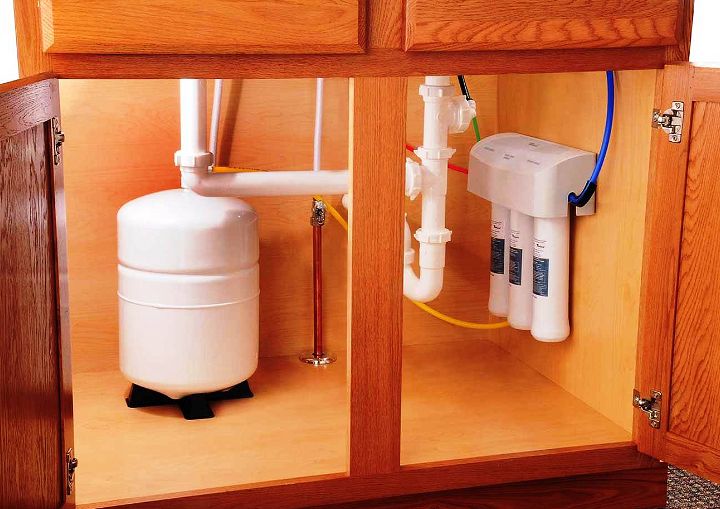Having the free reign to upgrade your living space is a great advantage. One such upgrade many wish to implement is a water filtration unit, namely an under-counter one. A little bit of research is required before purchasing your first filtration unit, to better understand what you need and what is available on the market.

Why Get an Under Counter Water Filter?
Water quality is the usual drive for choosing any water filtering system. Specific harmful elements can still find their way into tap water, even after it has been cleaned in municipal treatment facilities. With the desire to clean water quicker and more efficiently, under counter water filters are the best choice.
1) Types of Under Counter Water Filters by Water Quality
Depending on what these contaminating elements are, one may opt for a specific type of filter to be fitted under the sink.
Chlorine and Fluoride
Water filters that use activated charcoal are the most commonly used for treating water with excessive chlorine. Chlorine is often the cause of unpleasant smells and tastes. The small layered granules of charcoal or carbon through which the water is sifted, absorb a high percentage of it, offering better-tasting water.
For fluoride, however, something different is needed. Activated alumina and bone char are the best filter media here.
Heavy Metals and Limescale
Sometimes more serious problems plague a household’s water source like heavy metals or extreme limescale build-up. The best types of water filters that deal with these issues are ion-exchange and reverse-osmosis filters.
Ion-exchange filters utilize a resin bed that makes the calcium and magnesium not stick to each other and form limescale. Reverse osmosis, on the other hand, uses a semi-permeable membrane to remove close to 99.9% of impurities.
2) Space and Cost
Heavy metals aside, ion exchange and reverse osmosis filters both are quite capable of taking out other elements like chlorine and fluoride. The difference sometimes lies in individual needs. Some households don’t need the entire complex system of these two types of filters and an activated charcoal filter is more than enough.
Budgets and space constraints are other elements to consider. For one, space can be altered to accommodate a bigger filtration system, but the cost needs to be considered carefully. Multi-layered under counter water filters tend to be more expensive. Depending on what needs to be filtered out, alternatives can be found.
3) Installing an Under Counter Water Filter
Unlike a whole house water filtration system, an under-the-counter filter can be installed inline. There is also the option of implementing an entire whole house water filter under the counter if one wishes. The difference between the two can mean an extra expense.
A simpler under counter filter may only need a water source separate from the sink faucet. Thus it provides filtered drinking water via a separate faucet included in the product pack. Installing one of these filters can be done with regular DIY skills at no extreme risk to the entire plumbing system of the home. Whole house water filters are another matter as they may need professional plumbers, and this costs extra.
4) Maintenance
Once installed, maintaining an under sink water filter depends on the type used. Changing the activated charcoal cartridges with new ones for an absorption filter is usually the most important step. This comes with a little knowledge about the filter apparatus itself.
The O rings that hold each cartridge have to be inspected for damage and greased with a silicone-based lubricant. Details like these have to be taken into consideration when maintaining your under-the-counter water filter. Read more about how to maintain your system from this detailed guide.
5) Possible Setbacks
As with any investment, it’s good to consider both pros and cons. Some water filters tend to produce a lot of wastewater. Reverse osmosis filters in particular have this feature, as the brine water used for filtration needs to be purged out. That purged water can’t be used for anything and simply goes down the drain.
There is also the issue of moving house, which can lead to leaving the filtration unit already installed for the next owners. It’s quite impractical to strip out the filter and move it to a different place. The water quality in a different area affects the kind of filter needed and the old one may not be useful.
Weighing the Options
Weighing the options for a future purchase is important in deciding what water filter best suits you. In the end, improved water quality is the goal, and as such, any layer of filtration will greatly improve it, especially when all the pollutant factors of the water source are known.




